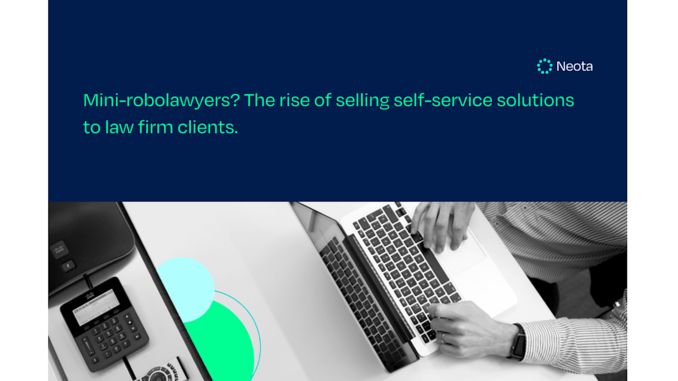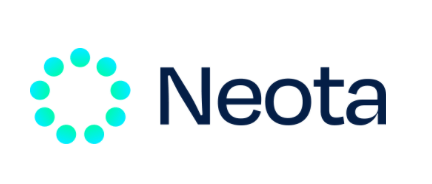
By Hasan Choudhary, Global Marketing Executive, Neota.
Thanks to the Netflixes, Amazon Primes, and DoorDashes of the world, we expect most things today to be ‘on-demand.’ Is it possible that this sentiment could pour over into the legal industry?
‘But law is different!’, you say. ‘Getting legal advice is not the same as scanning your groceries at self-checkout.’
It’s true that self-service legal advice has been criticized in the past. And yes, a computer’s capabilities have a limit, especially compared to a seasoned lawyer. Self-service solutions, however, are far from this limit.
Where did it all come from?
The rising omnipresent demand to deliver services cheaper, faster, and with greater accuracy has helped to grow legal automation and technology. At the same time, client expectations are changing.
So, what is the secret to maintaining a high quality of client service? The key is legal advice that’s 1) accurate, 2) accessible, accessibility can mean weeding out legal jargon to make key points clear, but it also means, quite literally, how easy it is for your client to access the information they need. And 3) communication.
How does it work?
Many law firms have built self-service solutions using Neota. In this model, clients answer a few guiding questions to receive personalized advice and materials in a digestible, actionable format. This allows lawyers to respond to their clients quickly and efficiently.
In solutions like these, the opening questions can be broad or narrow, and the questionnaire can easily be made ‘active’, i.e., a response to Question 1 changes which options are presented at Question 3. Logic-driven information gathering aims to narrow down a query, ascertain the issue at hand, and provide answers.
For example, one Neota customer built an execution clause identifier solution for their client. The end-user is now able to answer a short series of questions on the nature of a contract, and receive the right execution clause to insert directly into the document. The use cases are incredibly vast.
A key point to remember is that self-service solutions are just one component of client service. In some situations, 70% of queries could be satisfied by a digital solution, but another 30% may require greater attention. The solution makes it possible for legal team members to focus on that 30% by reducing the number of queries overall. Ultimately, this enhances your service delivery both in terms of speed and quality.
Why should you care?
Now, it isn’t time to start running for the hills due to the impending doom of robo-lawyers. And I can also hear “but what about the billable hour!” echoing around. We will get to that in a bit, just after I expand on the benefits here.
As above, your lawyers will now have more time to spend on intricate and complex matters, rather than spending time answering questions which can be answered by a digital solution.
An additional benefit of using Neota is its expert reasoning capabilities. You can pool expertise (of which law firms have plenty), to deliver advice and information with greater accuracy and confidence. Lawyer C might be aware of a slight caveat to put on the advice of Lawyers A and B. That knowledge only needs to be captured in Neota once for a digital solution to repeatedly deliver advice that’s informed by Lawyer C’s expertise. This is something several of our customers have noted and praised in the past, especially in cases of risk analysis and identification tools built in Neota.
Another benefit of Neota is that your subject matter experts, who know the issues inside and out, can create their own self-service tools. No coding is involved.
This also makes it much easier to update and maintain digital solutions without having to iterate and reiterate with your IT or dev team, or worry that the solution has to be taken offline due to update it.
Finally, delivering self-service tools to your customers hugely assists in understanding your client and their needs. Integrated data analytics in the Neota platform can help you identify which questions are asked the most, whether your clients are happy with the answers, and where they seek more advice over time. Understanding trends like this – with data points automatically provided to you – can be critical in strategy development and how you anticipate and approach your clients’ needs.
What about the billable hour and monetisation?
Right, here we are. Sadly, it is not a simple answer, but it is nonetheless good news and this is much more of an opportunity than something to fear. Here’s a few reasons why:
1.
The less time you spend on simple tasks which (literally) a computer can do, the more time you have to spend on complex, intricate tasks, which have much greater consequences. You might even get a little bit more free time (gasp) to make yourself a cup of coffee or anything, and ultimately reduce the risks of burnout or overlooking something important.
2.
Monetisation.
Digital solutions can be used as an added value to secure new work, marketed as stand-alone products, or sold via a less conventional subscription model – there are countless possibilities for monetisation in the current legal market. I know many of you might be thinking ‘but that’s not how law works!’ Well, the world is most certainly changing with digital transformation, and it’s better to be ahead of the pack than to redefine your service delivery after it’s too late.
3.
A final reason that self-service solutions are definitely more of a financial opportunity than something to fear is that they form a big part of the attractive and appealing nature of a tech-savvy law firm. I wouldn’t be shocking you by saying that potential clients expect more from their outside counsel than they did five years ago. Show off your digital solutions; show that you are forward-thinking and embracing technology.
Summary
So, self-service doesn’t sound all that bad, right? Ultimately, it is the next step in advisory delivery models, and if you don’t capitalize on it, it is very likely that your competitors will.
As law firms increasingly become one-stop-shops for a variety of legal and business concerns, it is all the more important that advice and information can be delivered quickly and easily, both to make the client experience smoother, and also to provide your lawyers with more time to deal with the matters requiring greater attention.
Self-service is never going to be the only form of legal service delivery, but it is going to be one of the most important. In every client-facing industry, client experience is fundamental. This experience, however, does not require speaking to, calling, or emailing your lawyer each time you have a question. The experience is more so the client’s experience with a law firm as an advisory tool. The quicker, easier, and more accessible this experience is, the better it is.

[ Artificial Lawyer is proud to bring you this sponsored thought leadership article by Neota. ]